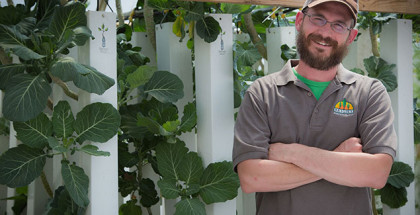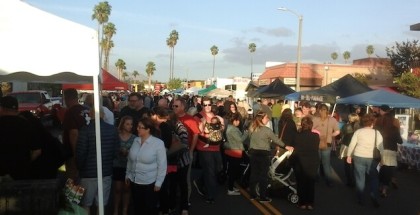6 Simple Ways To Support Local Food And Farmers
March 10, 2016 | Davina van Buren

Kevin Prather of Mellowfields Urban Farm and Common Ground urban farm, sells his produce at the Cottins Hardware Farmers Market. Image credit: Eileen Horn
Whether you are new to the local food scene, or you’ve been buying from your neighborhood farmers market for years, you’re making a big difference in the lives of small farmers and food distributors. But the food system is complicated. It’s not always clear how to spend your resources—whether to invest time or money—to best support your local food system.
So we’ve compiled six tips to make it even easier for you to support local food producers.
1. Shop at farmers markets
Farmers markets aren’t a new thing, but they have become much more visible and plentiful in many areas in recent years. Variety is the spice of life, so don’t limit yourself to staples you’ve eaten a thousand times. Farmers at the markets offer a diversity of fruits and vegetables and often provide recipes, or share easy ways to prepare foods with which you may not be so familiar.
For the best selection, arrive early. But for those days when errands, responsibilities, or much needed sleep-in time keep you from getting to the market at 7 a.m., never fear. Many vendors offer discounts on what’s left at the end of the day, and “ugly” produce that is harder to sell.
2. Join a CSA
Buy a Community Supported Agriculture share to ensure you get the freshest picks every week. Many CSAs deliver right to your door, or you can visit the farm to pick up your goodies, where you can ask to meet the people who grow your food in person. This is an excellent way to get kids involved in learning how important sustainable agriculture is for their future.
3. Eat at farm-to-table restaurants and cafés
Planning a birthday dinner or a special date night? Choose farm-to-table restaurants. You may pay a little more, but your purchase will help local farmers continue to provide food for their community, and more importantly, it won’t be teeming with hormones, antibiotics and GMOs.
Did you know that more chemicals are used to grow and process coffee than almost any other crop? Make sure your barista is not only using Fair Trade, but sustainably grown beans. (Yes, there’s a big difference.)
Fair Trade refers to the way workers are treated, not how the crops are grown. Look for labels that say “shade grown,” “bird friendly,” “organic,” and “Rainforest Alliance” to make sure you are paying for quality beans, not pesticide residue. You’re likely to find more choices at smaller, independently-owned cafés.
4. Help farmers market themselves
Did you get great service at that farm-to-table restaurant you visited? Did a local farmer offer tips on how to grow a healthy backyard garden? Were you invited on a farm tour where you learned something new, or your kids got to pet a lamb? Let the world know!
Many farmers are so busy, well, farming, that they don’t have enough time for marketing. A well-placed post (especially with a photo) on social media can do wonders for their morale, and their bottom line. Better yet, if you have marketing experience, offer a few hours of volunteer time or work out a trade for product. Everybody wins.
5. Patronize your local grocer instead of chain supermarkets
Smaller grocers are the middle men that make local foodstuffs available to you every day of the week. Often, they sell value-added products such as cheese, jams and jellies, canned goods, and salsas that may not be available at the weekend markets. At the very least, let the big players know you’d like to see more local options on their shelves. Local isn’t just a fad—it’s an economic force—and management knows that.
6. Shop at local gardening stores for seeds, soil, garden plants and supplies
Ready to start growing some of your own food? Fantastic. Frequent the local garden shop instead of the big home improvement stores for soil, pots, seeds, starter plants, compost teas and organic fertilizers. These stores are usually family-owned, and are probably not as busy, so employees will have more time to give you personal attention and gardening tips.
What other ways do you support local food endeavors? Let us know in the comments.












Submit a Comment